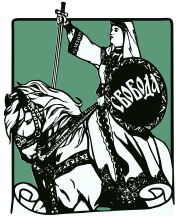
Back Konstitusiyalı Demokratiya Partiyası Azerbaijani Канстытуцыйна-дэмакратычная партыя Byelorussian Конституционно-демократическа партия Bulgarian Үндэһэн хуулиин арадшалһан нам BXR Partit Constitucional Democràtic Rus Catalan Konstitučně demokratická strana Czech Kadetpartiet Danish Konstitutionell-Demokratische Partei German Συνταγματικό Δημοκρατικό Κόμμα Greek Konstitucia Demokratia Partio Esperanto
This article needs additional citations for verification. (April 2014) |
Constitutional Democratic Party / Party of Peoples Freedom Конституционно-демократическая партия / Па́ртия Наро́дной Свобо́ды | |
|---|---|
 | |
| Abbreviation | K-D; Kadets |
| President | Pavel Miliukov |
| Founders |
|
| Founded | 12 October 1905 |
| Banned | 11 December 1917[1] |
| Merger of | |
| Headquarters | Saint Petersburg |
| Newspaper | Rech |
| Ideology | |
| Political position |
|
| Colours | Azure White |
| Slogan | Skill and work for the good of the Motherland (Russian: Умение и труд на благо Родине) |
| State Duma (1906) | 178 / 497 |
| State Duma (Jan 1907) | 124 / 518 |
| State Duma (Oct 1907) | 54 / 441 |
| State Duma (1912) | 59 / 432 |
| Constituent Assembly | 24 / 766 |
The Constitutional Democratic Party (Russian: Конституцио́нно-демократи́ческая па́ртия, romanized: Konstitutsionno-demokraticheskaya partiya, K-D), also called Constitutional Democrats and formally the Party of People's Freedom (Russian: Па́ртия Наро́дной Свобо́ды), was a political party in the Russian Empire that promoted Western constitutional monarchy—among other policies—and attracted a base ranging from moderate conservatives to mild socialists.[4][5] Party members were called Kadets (or Cadets) from the abbreviation K-D of the party name.[6] Konstantin Kavelin's and Boris Chicherin's writings formed the theoretical basis of the party's platform. Historian Pavel Miliukov was the party's leader throughout its existence.
The Kadets' base of support were primarily intellectuals and professionals; university professors and lawyers were particularly prominent within the party.[7] Many Kadet party members were veterans of the zemstvo, local councils.[8] The Constitutional Democratic Party formed from the merger of several liberal groupings, namely the Union of Liberation, the Union of Zemstvo Constitutionalists and the Union of Unions as well as the organization of bourgeois professionals and intellectuals, including teachers, lawyers, writers, physicians and engineers.[9][10]
The Kadets' liberal economic program favored the workers' right to an eight-hour day[11] and the right to take strike action. The Kadets "were unwaveringly committed to full citizenship for all of Russia's minorities" and supported Jewish emancipation.[12] The party drew significant support from Jews[13] and Volga Germans and a significant number of each group were active party members.[14][15]
- ^ https://www.marxists.org/archive/lenin/works/1917/nov/28.htm Decree On The Arrest Of The Leaders Of The Civil War Against The Revolution
- ^ Struve, Peter (1932). The Social Liberalism. Internationales Handwtsrterbuch des Gewerkschaftswesens. pp. 412–423.
- ^ Maksimov, Konstantin Nikolaevich (2008). Kalmykia in Russia's Past and Present National Policies and Administrative System. Central European University Press. pp. 172–173. ISBN 9789639776173.
- ^ Pipes, Richard (2011-05-04). Russia Under the Bolshevik Regime. Knopf Doubleday Publishing Group. ISBN 978-0-307-78861-0.
- ^ Pearson, Raymond (1977). The Russian Moderates and the Crisis of Tsarism 1914–1917. Springer. pp. 2–3.
- ^ This name should not be confused with the term cadets, which referred to students at military schools in the Imperial Russia.
- ^ Hans Rogger, Jewish Policies and Right-wing Politics in Imperial Russia, p. 20.
- ^ The Zemstvo in Russia: An Experiment in Local Self-government (eds. Terence Emmons & Wayne S. Vucinich), p. 441.
- ^ Melissa Kirschke Stockdale, Paul Miliukov and the Quest for a Liberal Russia, 1880–1918, p. 142.
- ^ James W. Long, From Privileged to Dispossessed: The Volga Germans, 1860–1917, p. 207.
- ^ Peter Gatrell, Government, Industry and Rearmament in Russia, 1900–1914: The Last Argument of Tsarism, p. 81.
- ^ Rogger, p. 20.
- ^ Rogger, p. 20.
- ^ Rogger, p. 20.
- ^ Long, pp. 207–208.